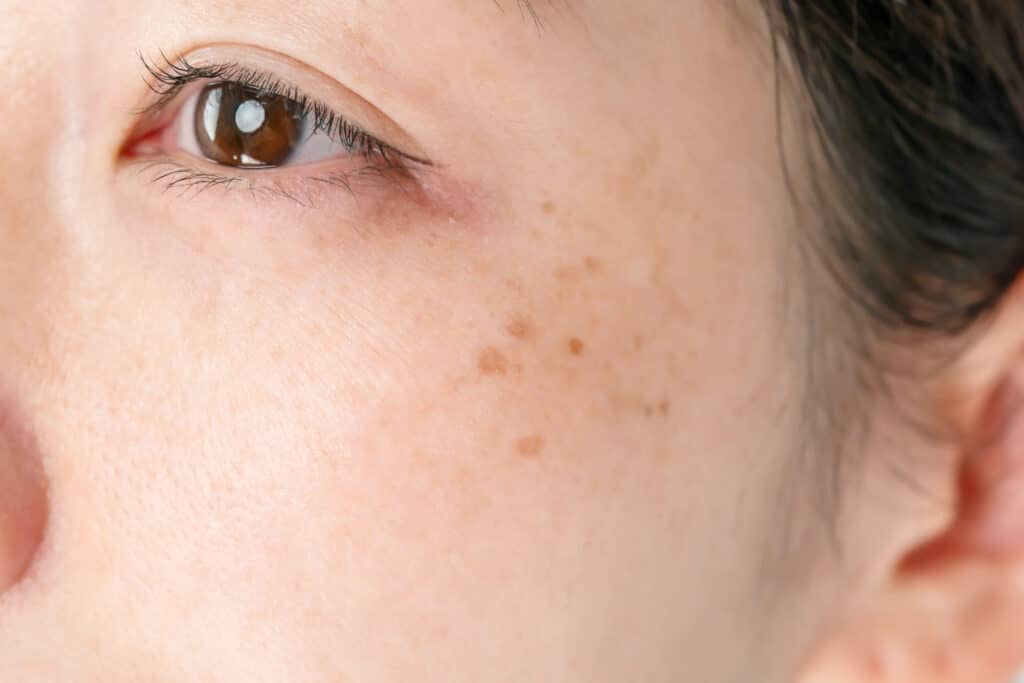
Dr Charlene Goh: 6 Mistakes People Make When Removing Pigmentation
- September 3, 2023


Pigmentation concerns, such as dark spots, freckles, melasma, and uneven skin tone, are common among many individuals, regardless of age or skin type. These stubborn discolourations can bebe frustrating and impact self esteem, causing people to resort to almost any solution.
For example, we have seen patients apply hydroquinone all over their body in their attempts to remove pigmentation. This method is not only unnecessary but can be harmful too. Like them, you may want a quick fix and a beautifully even complexion, but taking an ill-informed approach may lead to disappointment and setbacks.
This blog post highlights six common mistakes people often make when dealing with skin pigmentation and provides practical solutions for pigmentation management.
One of the most common mistakes people make when removing pigmentation is using harsh products. Such as strong chemical peels or aggressive exfoliants for quick results.
Exfoliation is a beneficial skincare practice that helps remove dead skin cells, unclog pores, and promote skin renewal. However, when done excessively or aggressively, it can irritate the skin and lead to redness, inflammation, and even worsen pigmentation by weakening the skin barrier.
Chemical peels, which can be more intense than off-the counter products, should be performed by trained professionals and not done on your own.
Solution: Opt for Gentle and Gradual Approaches
Instead of harsh products, choose gentle skincare products containing ingredients like vitamin C, niacinamide, and tranexemic acid and kojic acid. These ingredients can help fade pigmentation over time without causing unnecessary irritation.
Patience is key when dealing with pigmentation disorders. Always aim for gradual pigmentation improvement because it is safer and kinder on the skin.
Hydroquinone is a topical medication prescribed to lighten dark spots and pigmentation. While it can be effective, overusing hydroquinone can do more damage than good.
Hydroquinone cream comes in 2% and 4% dosages – the former for mild pigmentation issues and the latter for severe pigmentation. The cream should only be used twice daily for up to 12 weeks. Overuse or prolonged use may cause skin thinning, increased sensitivity, and rebound pigmentation.
Solution: Follow Professional Recommendations
When using hydroquinone, you should follow professional advice. Consult with a skincare doctor to determine the appropriate concentration and duration of use. A safe and effective approach may involve cycling hydroquinone with other pigmentation-fighting ingredients.
Consistency is crucial in any skincare routine, especially when dealing with pigmentation. Skipping treatments or failing to follow a pigmentation-friendly skincare regimen can hinder progress and delay desired results.
Solution: Establish a Routine and Stick to It
Create a consistent skincare routine that includes gentle cleansing, proper hydration, daily sunscreen and regular application of treatments for pigmentation. *Please note that for most cases, a skincare routine alone is hardly enough for pigmentation removal. It is however necessary to SUPPORT pigmentation treatment.
Various factors, such as sun exposure, hormonal fluctuations, and inflammation, can influence pigmentation. It is important to address these underlying causes to ensure the success of your pigmentation removal efforts.
Identify potential triggers contributing to pigmentation, such as excessive sun exposure, hormonal changes, or skin conditions. Use sunscreen daily, consider hormone-balancing treatments, and address any inflammatory skin issues to support pigmentation removal. If your pigmentation is due to pregnancy, it may take months after delivery to resolve. Targeted treatments after delivery can help to speed up this process after delivery. is best to wait for it to resolve after delivery.
Some individuals attempt to tackle their pigmentation independently without seeking professional advice or adhering to them. This approach can lead to ineffective treatment and may even be detrimental to your skin.
Solution: Consult a Skincare Professional
Seeking guidance from a skincare professional is essential for effective pigmentation removal. They can assess your skin, identify the cause and type of pigmentation, and recommend the most suitable treatment options. A personalised approach will yield better outcomes and ensure that your skincare routine addresses your specific concerns. Follow treatment protocol and your doctor’s advice too – failure to comply is one of the biggest reasons why pigmentation treatment doesn’t work.
Expecting immediate and dramatic results when removing pigmentation is a common mistake. Pigmentation is a complex concern, and results will take time to become noticeable.
Solution: Be Realistic and Patient
Set realistic expectations and understand that pigmentation removal is a gradual process. Consistent effort and patience will lead to more satisfactory and lasting results. How fast pigmentation fades depends on various factors such as the type of pigmentation, hormonal and environmental factors and it can take anywhere between 3-6 months of consistent effort to start to see results.
Removing pigmentation requires a thoughtful and patient approach. At SL Aesthetic Clinic, we offer a variety of pigmentation treatments, including peels and lasers. Where necessary, we’ll also suggest combination treatments.
Our team of experienced doctors will provide personalised recommendations, ensuring the best possible outcomes for your skin. Book a consultation today.
Like what you read? Share them!